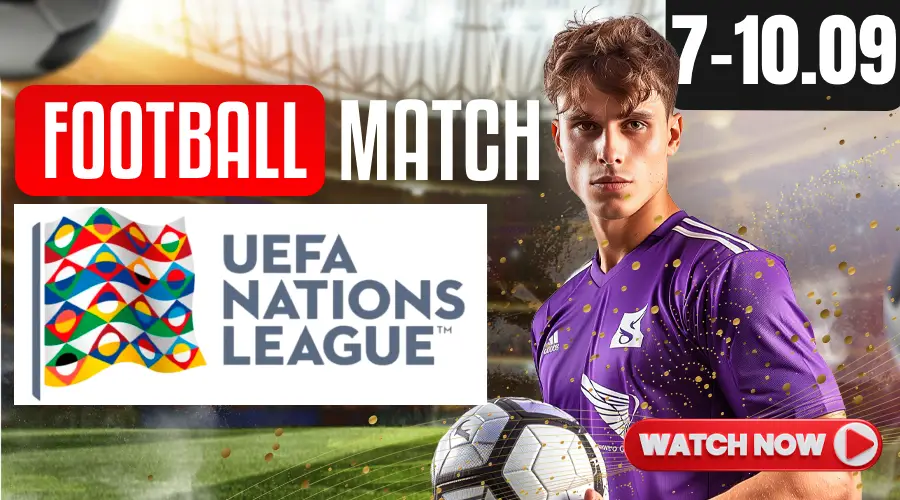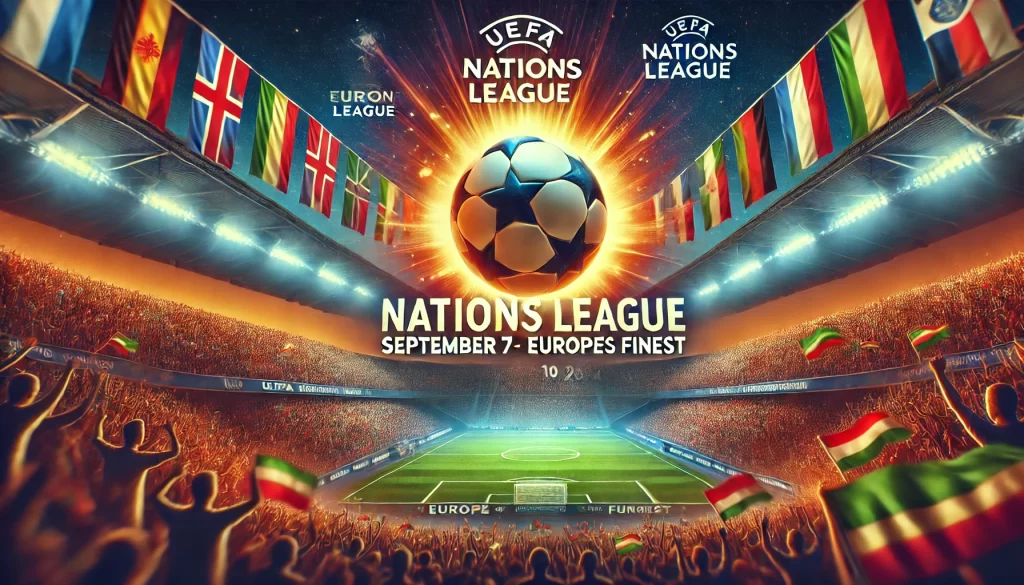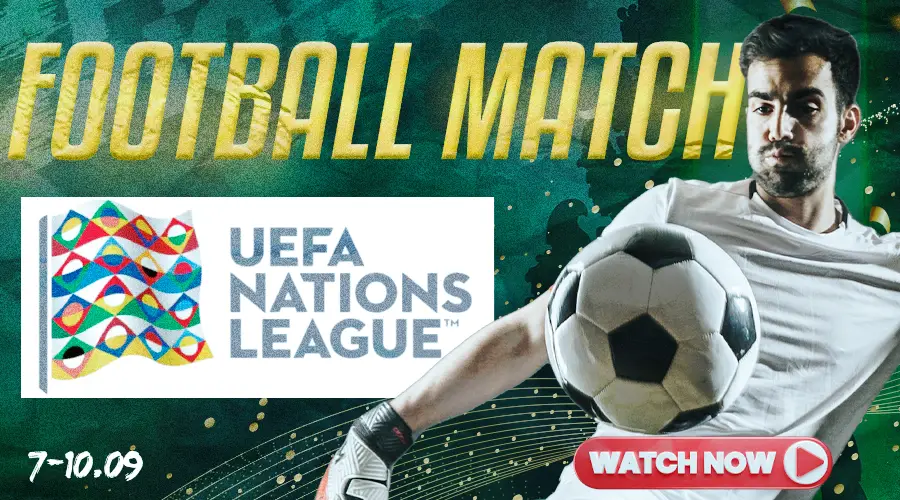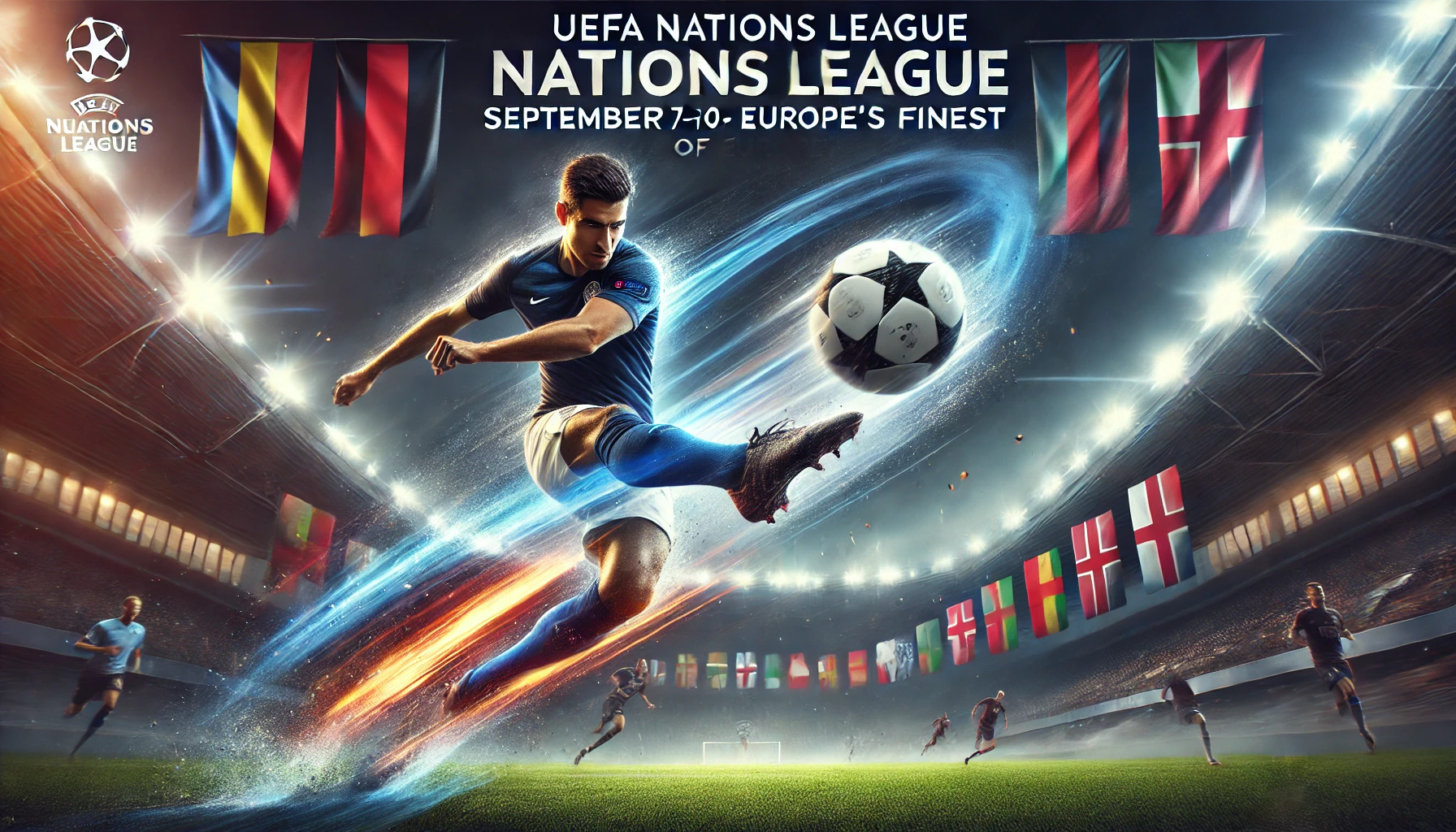The UEFA Nations League has quickly established itself as one of the most captivating international football tournaments in the world. Introduced in 2018 to replace the often-maligned international friendlies, the competition has injected new life into the international football calendar, offering fans competitive and meaningful matches. From September 7 to 10, 2024, the tournament will once again take center stage, with national teams across Europe vying for glory. As the competition heats up, let’s delve into the significance of the Nations League, the format, and what to expect from the upcoming matches.
1. Understanding the UEFA Nations League
The UEFA Nations League was conceived to address the growing disinterest in international friendlies, which often lacked competitive edge and significance. The idea was to create a tournament where every match mattered, providing teams with something to play for beyond the usual qualification games for the World Cup or the European Championship.
The Nations League is structured into four leagues—A, B, C, and D—each comprising groups where teams of similar rankings compete. The leagues are dynamic, allowing for promotion and relegation, ensuring that even the smallest nations have a chance to rise through the ranks.
- League A: The top tier, featuring Europe’s footballing powerhouses.
- League B: The second tier, with strong teams looking to break into the top ranks.
- League C: The third tier, offering competitive matches for mid-level teams.
- League D: The fourth tier, where smaller footballing nations compete.
Teams within each league are split into groups and play home-and-away matches. The group winners in League A advance to the Nations League Finals, while those in Leagues B, C, and D can earn promotion to a higher league. Conversely, teams that finish at the bottom of their groups face relegation to a lower league. This format ensures that every match is meaningful and that there’s always something at stake.

2. The Stakes of the September 2024 Matches
As the Nations League enters its critical stage from September 7 to 10, 2024, the stakes are higher than ever. Teams in League A will be battling for a place in the Nations League Finals, which offers not just a prestigious title but also the chance to secure a better seeding for future tournaments. For those in the lower leagues, promotion is the goal, while others will be fighting to avoid the drop to a lower tier.
These matches are not just about silverware; they’re about pride, ranking points, and the future. National teams use these games to build momentum and confidence as they prepare for major tournaments like the UEFA European Championship and the FIFA World Cup.
3. Key Fixtures and Matchups
The September 2024 matchdays feature some thrilling encounters, with both established powers and emerging nations looking to make their mark. Here’s a look at some of the most anticipated matches:
- Italy vs. Germany (League A, Group 1): One of the most storied rivalries in European football, Italy and Germany’s clash is set to be a tactical battle of the highest order. Italy, the reigning European champions, will be looking to assert their dominance on home soil, while Germany, under the guidance of a new generation of talent, seeks to reclaim its position as a top contender. This match could well decide the group’s outcome, with both teams vying for a spot in the Nations League Finals.
- France vs. Portugal (League A, Group 3): In a rematch of the 2016 UEFA European Championship final, France will take on Portugal in what promises to be a clash of titans. France, boasting one of the most talented squads in the world, will be eager to cement their place in the Nations League Finals. On the other hand, Portugal, led by the evergreen Cristiano Ronaldo, will be aiming to replicate their success from the inaugural Nations League in 2019. This match could have significant implications for both teams’ paths to the Finals.
- Spain vs. England (League A, Group 4): This encounter pits Spain’s technical brilliance against England’s youthful exuberance. Spain, known for their possession-based football, will look to dominate the midfield, while England’s pace and attacking flair could prove decisive. With both teams possessing World Cup aspirations, this match will be a crucial test of their credentials. The outcome could determine the group winner and potentially impact their seeding for future tournaments.
- Netherlands vs. Belgium (League A, Group 2): The Low Countries derby is always a fiercely contested affair. The Netherlands and Belgium, both known for their attacking prowess, will go head-to-head in a match that could be pivotal in determining who tops the group. With stars like Kevin De Bruyne and Frenkie de Jong likely to be in action, this match promises to be a thrilling showcase of European football at its best.
- Croatia vs. Denmark (League A, Group 1): Croatia, the World Cup runners-up in 2018, will face a tough challenge against Denmark, a team that has consistently punched above its weight in recent years. This match is crucial for both teams as they aim to challenge Italy and Germany for a place in the Finals. The tactical acumen of both sides will be on full display, making this a must-watch encounter.
These matches, and many others, will be watched by millions across the globe, with national pride and international ranking points on the line.
4. Emerging Stars and Established Legends
One of the most exciting aspects of the UEFA Nations League is the opportunity to see both emerging talents and established legends in action. The September 2024 fixtures will feature a mix of both, with several young players looking to make their mark on the international stage.
- Jude Bellingham (England): At just 21 years old, Bellingham is already regarded as one of the brightest young talents in world football. His performances for both club and country have drawn comparisons to some of the game’s greats, and the Nations League presents another opportunity for him to showcase his immense talent.
- Pedri (Spain): Another young prodigy, Pedri has been a revelation for both Barcelona and the Spanish national team. His vision, passing ability, and maturity beyond his years make him a key player for Spain. Fans will be eager to see how he performs against top-level opposition in the Nations League.
- Gianluigi Donnarumma (Italy): Already a household name despite his young age, Donnarumma has established himself as one of the best goalkeepers in the world. His heroics in the Euro 2020 final are still fresh in the memory, and Italy will be hoping he can continue his fine form in the Nations League.
- Kylian Mbappé (France): A superstar in every sense of the word, Mbappé has already achieved so much in his career, and he’s still only 25. The Nations League offers another platform for Mbappé to showcase his skills and lead France to glory.
- Cristiano Ronaldo (Portugal): Despite being in the twilight of his career, Ronaldo remains one of the most dangerous players in world football. His leadership, experience, and goal-scoring ability will be crucial for Portugal as they seek to reclaim the Nations League title.
These players, along with many others, will be key figures in their respective teams’ quests for success in the Nations League. Fans will be eager to see how they perform under the pressure of high-stakes international football.

5. The Impact of the Nations League on European Football
Since its inception, the UEFA Nations League has had a significant impact on European football. Initially met with skepticism, the tournament has quickly silenced its critics by delivering competitive and entertaining football. The traditional format of international friendlies often led to uninspired matches, but the Nations League has injected new life into the international calendar.
One of the key benefits of the Nations League is that it provides smaller nations with meaningful competition. In the past, these teams would often struggle in qualification campaigns and be left without much to play for. However, the Nations League’s tiered system ensures that they have a chance to compete against teams of a similar level, with the opportunity to earn promotion and compete against stronger sides.
For the bigger nations, the Nations League offers a valuable opportunity to test themselves against top-tier opposition outside of major tournaments. This has proven beneficial in terms of team development, as managers can experiment with tactics and personnel in a competitive setting.
Moreover, the Nations League has helped to maintain fan interest in international football during periods when there are no major tournaments. The matches are more competitive and meaningful than traditional friendlies, which has resulted in higher viewership and greater engagement from fans.
6. Predictions and Expectations
As the September 2024 fixtures approach, predictions and expectations are running high. The UEFA Nations League is notoriously difficult to predict, given the quality of the teams involved and the competitive nature of the tournament.
- League A Predictions: In League A, the group stages are expected to be fiercely contested, with no clear favorites emerging. However, teams like France, Spain, and Italy are likely to be among the front-runners for the semi-finals. Germany and Portugal are also strong contenders, but they face tough competition in their respective groups.
- Dark Horses: While the traditional powerhouses are expected to dominate, there is always the possibility of a surprise package emerging. Teams like Croatia and Denmark have shown in recent years that they can compete with the best, and they will be looking to make their mark in the Nations League.
- Relegation Battles: At the other end of the spectrum, the battle to avoid relegation will be intense. Teams like Sweden, Switzerland, and Poland will be fighting to stay in League A, while the likes of Scotland and Serbia will be looking to avoid the drop in League B.
Overall, the September 2024 fixtures promise to be an exciting and unpredictable affair. The Nations League has a history of delivering surprises, and this round of matches is unlikely to be any different.
7. The Fans’ Perspective
The UEFA Nations League has not only been a hit with the teams and players but also with the fans. The competitive nature of the tournament has resulted in a higher level of engagement from supporters, who appreciate the increased stakes and quality of the matches.
For fans, the Nations League offers the chance to see their national teams compete against top-level opposition in meaningful matches. The tournament’s structure, with promotion, relegation, and the opportunity to win a trophy, adds an extra layer of excitement that is often missing from traditional friendlies.
The September 2024 matchdays are expected to draw large crowds, both in stadiums and in front of televisions. The atmosphere in the stadiums will be electric, as fans rally behind their teams in pursuit of Nations League glory.

8. The Future of the UEFA Nations League
As the UEFA Nations League continues to grow in popularity, its future looks bright. The tournament has proven to be a success, and there are already discussions about expanding and evolving the competition to further enhance its appeal.
One possibility is the introduction of a Nations League for women’s football, which would provide a similar platform for female players to compete in a high-stakes, competitive environment. This would be a significant step forward for the women’s game and could help to elevate its profile on the international stage.
Additionally, there have been talks of expanding the Nations League to include teams from outside Europe. This could involve inviting guest teams from other continents to participate, adding a global dimension to the competition. While these discussions are still in the early stages, they highlight the potential for the Nations League to evolve and expand in the coming years.
9. Conclusion: A Celebration of European Football
The UEFA Nations League has quickly established itself as one of the most exciting and competitive tournaments in international football. The September 7-10, 2024 matchdays will be a celebration of European football at its finest, featuring high-stakes matches, world-class talent, and passionate fan support.
As teams from across Europe prepare to battle it out for Nations League glory, fans can look forward to four days of intense and captivating football. Whether it’s the marquee matchups between traditional powerhouses or the relegation battles in the lower leagues, the Nations League promises to deliver drama, excitement, and unforgettable moments.
As the competition continues to grow and evolve, the UEFA Nations League is set to become an integral part of the international football calendar, providing a platform for Europe’s best teams to showcase their skills and compete for one of the most prestigious titles in the game.

Leave a Reply